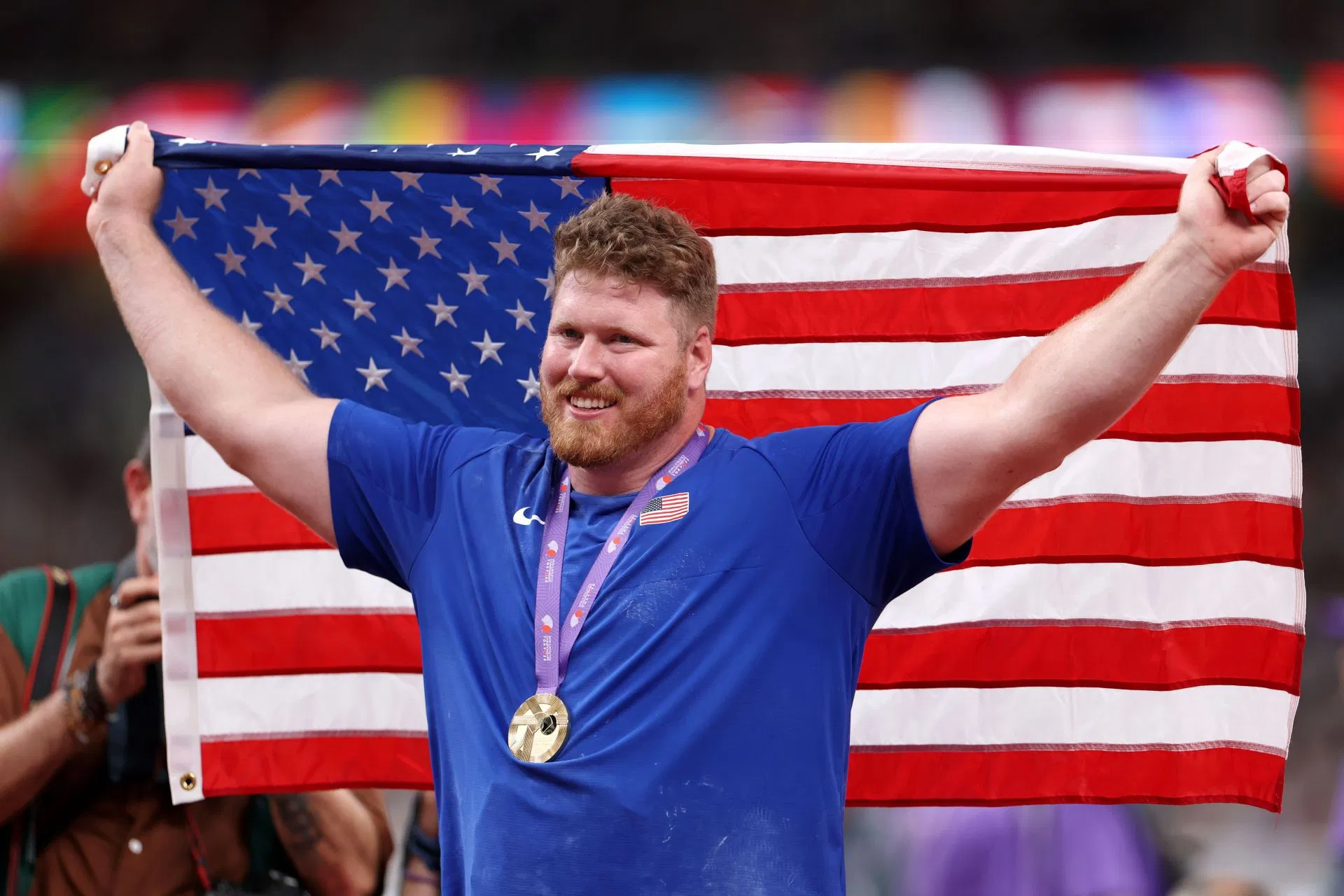Day one of the Tokyo 2025 world championships was amazing in its own right; from Evan Dunfee and Maria Perez in the 35km road walk early on a hot and steamy morning, to Beatrice Chebet and Ryan Crouser on a still hot and still oppressive opening night it dripped with class as we all dripped with perspiration.
 My personal moment of inspiration however came the moment we walked into the stadium and down to our seats – middle of the back straight, four rows from the front. They’re plastic seats now, not wooden bench style. And it’s a totally renovated stadium, replacing the original national stadium built for the 1964 Olympic Games.
My personal moment of inspiration however came the moment we walked into the stadium and down to our seats – middle of the back straight, four rows from the front. They’re plastic seats now, not wooden bench style. And it’s a totally renovated stadium, replacing the original national stadium built for the 1964 Olympic Games.
But I’d been there before, sat in almost the identical seat for one of the greatest moments of athletics I have personally witnessed, the epic long jump battle at the 1991 world championships which saw Carl Lewis lose for the first time in almost 70 competitions and Mike Powell break Bob Beamon’s 8.90 metres world record.
Hard to beat, but the opening night gave it a red-hot try.
There’s something about the first few moments of a major sporting event. The first 20 minutes of a football final or the first round of one of the tennis or golf majors. Nothing gets decided – for the most part, anyway – but a tone can be set; statements made; form revealed.
So it is with the world championships. Four gold medals on day one at Tokyo25 – Evan Dunfee, so often winding up with the boiled lollies, took a well-deserved gold medal in the men’s 35km road walk; Maria Perez, already rich on the chocolates with double gold in Budapest two years ago, retained her title in the same event; Ryan Crouser competing for the first time in 2025 and retaining his shot put title; Beatrice Chebet doing the same in the 10,000.
On these, and a few other questions, we are now decided. The weather, for example. If you didn’t know it was going to be extremely hot and enervatingly humid before you got here, you know now. Endurance athletes, throwers and track distance runners aren’t supposed to enjoy heat and humidity. Someone forgot to tell the walk gold medallists; Chebet and Crouser didn’t get the memo: if they did, they didn’t read it.
 Crouser is very obviously a force of nature, but he rules an event in which there are now any number of throwers rising to the levels he, largely, has set. And he had not competed in 2025 – using his champion’s wild card to get here – and not at all for a full 12 months.
Crouser is very obviously a force of nature, but he rules an event in which there are now any number of throwers rising to the levels he, largely, has set. And he had not competed in 2025 – using his champion’s wild card to get here – and not at all for a full 12 months.
Surely he could not win here then. Just as surely, he did. Tom Walsh, one of those who would have been a multiple gold medallist in any other shot put era, almost was in Doha in 2019, kicked off with a 21.53 effort in round one. No matter, Crouser landed a 21.99 monster right on the arc of tape at 22m.
In round five, things went up a notch. Several notches, in fact. The Italian Leonardo Fabbri, who had also slipped past Walsh, threw 21.94. Walsh threw 21.94 and there were suddenly three within five centimetres. Unperturbed, Crouser unleashed a 22.34 effort.
Just as it looked like the medals were decided, Mexico’s Uziel Munoa landed another effort right on the 22m tape. This one came in at 21.97. Neither Fabbri, nor Walsh could respond so it was Crouser, Munoz and Fabbri for the medals with the luckless Walsh slipping out of the bronze medal position on countback.

Chebet entered the 10,000 metres as heavy favourite. For the first half of the race it looked as if things were playing her way as she and Kenyan teammate Agnes Ngetich took turns to lead. A 2:54 fourth kilometre only reinforced the impression of Kenyan dominance as the leaders went through half-way in 15:16.31.
Gudaf Tsegay, though, refused to drop and she sat in behind Chebet, along with Italy’s Nadia Battocletti. Then, with a kilometre to go, Tsegay pulled the sort of tactical flip Paul Tergat used against Haile Gebrselassie in the Sydney 2000 Olympic 10,000. Then it was Tegat who took off at the final 200 and tried to out-kick the supreme kicker. Here, it was the habitual sitter Tsegay who surged away in the last 1000 metres.
Tsegay could not sustain the pace throughout the 60-second final lap but it was a darned near run thing. In the last 200 it was actually Battocletti who posed the greater threat. But Chebet prevailed, 30:37.61 to 30:38.23, with Tsegay taking the bronze in 30:39.65. the last kilometre whizzed past in a mere 2:38.7.

Don’t-cha bet against Chebet seemed to be the order of the day. A 5000-10,000 double in Budapest and now an epic win in Tokyo to retain the 10,000 crown.
In ninth place Lauren Ryan ran 31:27.78, a great run in the conditions.



